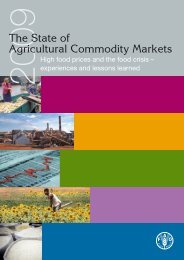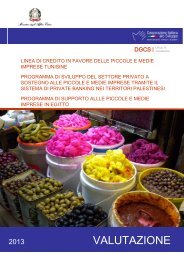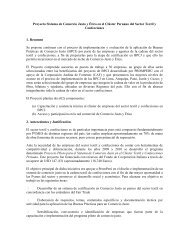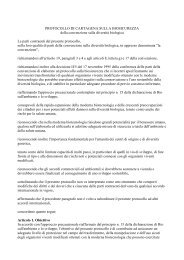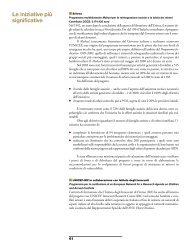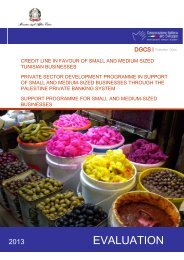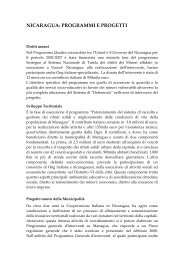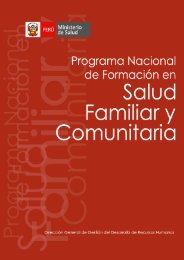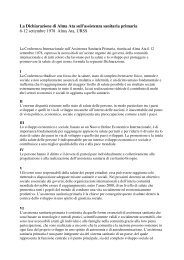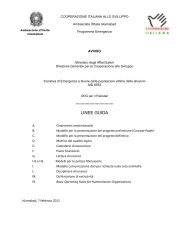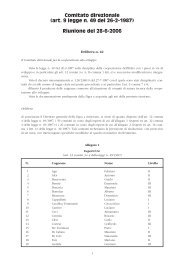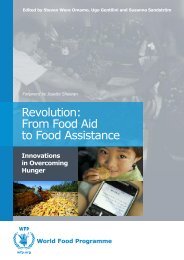The discussions on the possibility of breaking the pactOne of the most delicate steps of the action undertaken by the institutions thatoperate in the field is represented by the moment that the victim foresees thepossibility to break the pact and eventually enter into the programme of guaranteedaccompaniment envisaged by Art. 18. The discussions - generally made by a groupcomposed of social operators, cultural and psychological mediators - are normallyof short duration: one or two meetings to verify the real determination of the victimand to avoid second thoughts which are very frequent. The most problematicelement of this phase is, in nearly all the testimony collected by the operators, theopportunity to file a report, that the major number of institutions, in agreement withthe Police and magistrates, consider being the privileged path to accede to the exitprogramme. We will speak about this again in the following paragraphs, but t<strong>here</strong>are also other difficulties.Generally, the first and major difficulty encountered by the operators is the fearof the victim for the consequences of a transgression of the pact sealed by thewodoo rite. Above all, the victim must be given all the material reassurances on theprotection she will receive (her placement safely in a “house of escape”, ifnecessary, her being taken care of in economic, health, legal terms, etc.). But it alsodeals with supplying a surplus of moral, psychological and in some cases spiritualreassurance, regarding the sense of treachery of a pact which often morally obligesthe victim not only towards the exploiters, but also towards the family and moregenerally towards the community to which she belongs.This delicate phase of accompanying the girl towards the decision to turn herback on the life she is living comes about in different forms and with a greatdifference between the lay organisations and those of more marked religiousinspiration. While in the first case the working means prevalently emphasises theprospect of gaining freedom and self-determination, in the second the means areprevalently a relationship which hinges on the emotive elements of faith and thesense of belonging to the community of the faithful: this last means finds strongreciprocity in spirituality and in the community vision of the existence of theNigerians.In other terms the reassurance coming from the faith has proved, to manyNigerian victims, to be an efficacious functional substitute for the pact whichobligates towards the community, so as to configure itself subjectively as aconvincing defence against physical and moral ills, feared for the transgression ofthe wodoo pact, an unassailable protection against curses.In some cases the antagonism between the Christian faith and wodoo isfundamental in determining the success of the exit path by the victim. Thissituation has a Christian sub-stratum which gets the upper hand against the animistbelief, thanks to the change in the context of life and to the weakening of the familyand cultural bonds with the country of origin: “I was always afraid of thesewodoos, but now I go to church, I no longer am frightened of these things. Whenone believes in the Bible, if you are frightened read the Bible, your fear will pass”(Interview Victim No.2).
On this point t<strong>here</strong> is a strong agreement on the points of view of the socialoperators, whether of a lay type or of religious inspiration. Faith and liturgy seemto have a very important role in accompanying the victims of Nigerian origintowards liberation. Not only do they “dip into the same imaginary symbol andritual” - as also recognised by a psychologist of lay orientation - but theycontribute to restore the sense of belonging to a “new family”, and cancel thesolitude experienced and the crisis of identity of the woman, which appear at themoment that the important links to their own community of origin seem to be less.For this reason the idea of a “counter-rite”, that came out of an interview as apossible prospective to liberate the woman from the belief in wodoo, seems to bereductive. The operators appear to concur on the fact that it is the experience livedand shared by faith to un-snare the mechanism of blind obedience to the pact.According to the testimony of a religious person who for many years operatesin support of Nigerian victims: “The mechanism, [of exiting the logic of wodoo,Ed.] starts when they realise, as is said, that God is stronger than wodoo. Thesecond element which should start is that they feel loved by God (…) because thiselement of their spirituality is so strong that it is impossible to cancel it and verymuch affects their choices” (Caritas Servizio Migranti - Turin).A religious operator observes that for the Nigerian women do not considerCatholicism as the westerns: “What is important is the concept of good; he whodoes good, cannot be badly paid”; the women, even those that do not pray, “havesolid principles tied to tradition and to the culture of origin: they have morals, arevery severe, even with us nuns” (Caritas - Udine).Besides the psychological dimension, the operators emphasise also in this phasethe difficulty to collect reliable and circumstantial elements on the stories, ties, andaspirations of the victims, to not speak about the news useful to sustain a penalcomplaint to the persons who exploited them. The difficulty to reconstruct the realidentity and name of the exploiters, the code of silence attitude sometimes on thepart of the victims, the fact that often at the time of the complaint the circumstancesof the exploitation have changed (possibly because the madam has alreadyescaped): are all situations that can prolong or make investigations useless andlengthen the time to obtain the permission to stay.Obligation to denounce or only adhesion to the social project?Even if in some geographical areas (for example, Naples, Caserta, Rimini) theconceding of a permission to stay is frequent for reasons of social protection,through the paths, without complaint, the most widely used practise is that whichsees the complaint as a “master way” to obtain a benefit.It should be noted that the tie to the existence of filing a report, as a condition toaccede to the social protection and integration programme, is significantly decisiveon matters of overcoming the experience. The path which passes through filing acomplaint is longer, complex, risky, and sometimes lived by the woman as animposition and a violence. Under the psychological profile, it is a painful job toreview her own experience and a complex attempt, which does not always produce
- Page 1:
TRAFFICKINGOF NIGERIAN GIRLSTO ITAL
- Page 5 and 6:
F O R E W O R D1. Objectives and st
- Page 7 and 8:
and who have identified the most si
- Page 9 and 10:
on the other hand, for those involv
- Page 11:
Case files analysed: Preventive det
- Page 15 and 16:
Table 2 - Socio-economic situation
- Page 17 and 18:
Table 3 - Nigerian citizens regular
- Page 19 and 20:
Table 5 - Social protection permiss
- Page 21 and 22:
Table 7 - Number of persons charged
- Page 23 and 24:
Table 8 - Detainee population sub-d
- Page 25 and 26:
and the United States enables this
- Page 27 and 28:
C H A P T E R IW a y s a n d p h a
- Page 29 and 30:
Figure No.2 - Edo State.It is not c
- Page 31 and 32:
Nigeria. From 1996 in Benin City an
- Page 33 and 34:
In this variegated framework, the d
- Page 36:
“Benin City is one of those State
- Page 39 and 40:
Various privileged witnesses of the
- Page 41 and 42:
In the first years of the traffic o
- Page 43 and 44:
pay considerable sums for lodging,
- Page 45 and 46:
The routesWe find at least three ty
- Page 47 and 48:
Figure No.5 - Trafficking routes th
- Page 49 and 50:
The journey overland through Africa
- Page 51 and 52:
new dispositions and contacts to co
- Page 53 and 54:
Then he sends her in a taxi to the
- Page 55 and 56:
T. remains in this house for 21 day
- Page 57 and 58:
detainees go towards the refectory,
- Page 59 and 60:
At this point the organisation esco
- Page 61 and 62:
was accepted by the Ivory Coast pol
- Page 63 and 64:
B.E. «Yes, I was given a Ghanaian
- Page 65 and 66: Now the documents are “hired”:
- Page 67 and 68: It is understood however that the v
- Page 69 and 70: “There is no Nigerian passport wh
- Page 72 and 73: C H A P T E R I VL i v i n g a n d
- Page 74 and 75: have no shop and then there is no p
- Page 76 and 77: The cost to manage the house and th
- Page 78 and 79: mine since a long time, he can’t
- Page 80 and 81: A feminine managementIn analysing t
- Page 82 and 83: “There are many pimps that when y
- Page 84 and 85: The control of movementThe fact tha
- Page 86 and 87: Physical punishments can be made by
- Page 88 and 89: Control between psychological subje
- Page 90 and 91: arms), tortured in many different f
- Page 92 and 93: C H A P T E R VT h e o r g a n i s
- Page 94 and 95: Each penal procedure on the subject
- Page 96 and 97: Often it is the same madam who move
- Page 98 and 99: Even in numerous recent criminal pr
- Page 100 and 101: work arrangements (…) persons tha
- Page 102 and 103: man all the money she had in the ho
- Page 104 and 105: in the plates and everything and th
- Page 106 and 107: exploitation) has reached an amount
- Page 108 and 109: C H A P T E R V IT h e e n d o f t
- Page 110 and 111: A: «You have to bring me a present
- Page 112 and 113: Often the family is however not abl
- Page 114 and 115: the different evaluations of the as
- Page 118 and 119: eal results: to distance herself fr
- Page 120 and 121: of a different culture is very impo
- Page 122 and 123: C H A P T E R V I IC o n s i d e r
- Page 124 and 125: In the case of the girls having mor
- Page 126 and 127: As has been many times noted, the c
- Page 128 and 129: under the profile of the “quality
- Page 130 and 131: person to obtain either relevant re
- Page 132 and 133: Numerous are the criminal juridical
- Page 134 and 135: If the accused claims to not knowin
- Page 136 and 137: sanctions, sometimes, also in prese
- Page 138 and 139: d) Investigative and judiciary co-o
- Page 140 and 141: The reform foresees, under Art. 1,
- Page 142 and 143: which the woman can definitively tu
- Page 144 and 145: witnesses, social operators - agree
- Page 146: and necessary, therefore, to think
- Page 149 and 150: in many cases they are driven to th
- Page 151 and 152: Melossi, D., (2002), “Le teorie s



